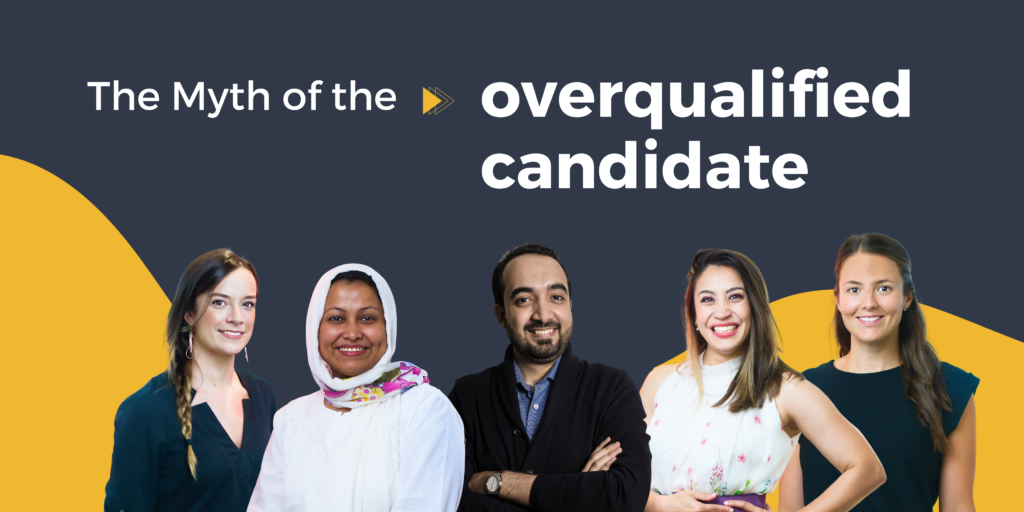

In almost every search we conduct, there are always a handful of candidates whose experience and education alone transcend the requirements of the role. When this happens, we often hear:
“They will get bored and leave within a year.” “They will have expectations that we can’t meet!”
But what does it actually mean to be ‘overqualified’ and is it code for something else?
The lead on a ‘perceived overqualifications’ study, Berrin Erdogan, found that overqualified employees typically don’t stay or leave a company because they feel ‘overqualified’. They stay or leave because of workplace culture and conditions.
What does this tell us?
We’ve compiled insight and suggestions from members of our Placemaking and Communications teams who have experience navigating common misconceptions about overqualified talent.
Julie Diaz-Beltran (Placemaker): “It has to do most of the time, with fear, in my opinion. For example, concerns regarding how long the person will stay with the organization (and what this might imply), if they will be satisfied or not by the job, how the team will feel and act, or in some cases, the fear of managers and direct supervisors feeling intimidated by the candidate’s credentials.
It’s natural to have these fears, however, it’s important to acknowledge and consider flipping these ‘reasons’ for feeling or seeing an ‘overqualified’ candidate as a negative prospect to a positive: how could this person uplift the position and the overall dynamic of the team?”
So how can employers shift their mindset to embrace ‘overqualified candidates’?
We encourage employers to think more about alignment and less about ‘overqualification’. Candidates with international experience, for example, should be given the opportunity to demonstrate their abilities. The exception being if the opportunity needs to consider certain licensing requirements (like in the medical or legal field).
Just recently, Stats Canada (2022) found that employers are essentially “leaving talent on the table” by failing to recognize the training and qualifications of workers educated abroad once they’re here.
Note that more than 1.3 million new immigrants have permanently settled in Canada between 2016 and 2022, the highest such number ever in a Canadian census.
Amr ElKhashab (Placemaker): “In any hiring process, the end goal is to determine if screened candidates can do the job or have the aptitude to learn how to do the job. However, when adding another layer, which is the international experience but lacks specific Canadian experience, considerations for the role can take place in the following areas: 1st: jobs that require registering with a governing body (e.g. doctors, Sr Engineers, Social Workers, etc). 2nd: jobs that require local regulation/bylaws (e.g. Senior Municipal Engineers, Urban Planners, Labor Relations, etc) OR 3rd: a job that requires a security clearance (much harder to get with exclusively non-Canadian experience).”
Julie Diaz-Beltran (Placemaker): “Providing a space to go beyond the ‘over qualifications’ and the inner motives of why ‘overqualified’ feels negative, is an ideal first step. It is important to consider the candidates’ motivations for applying. Some of the initial concerns with being ‘overqualified’ can be addressed and looked at through different lenses. If the candidate is already being considered ‘overqualified,’ then it should mean that considerations regarding the execution of the role might not be an issue.”
Robynne Baxter (Human Dynamics Lead):
It’s important to consider:
- The job market is shifting. People in general aren’t staying in roles as long as they have in the past. The idea ‘that overqualified people leave’ could be made about any candidate.
- Imagine the impact this candidate could have within a short period of time within the organization. The possibility of someone coming with new, additional skills and experience you may not have thought of before. For example, will the organization be better off in 12 months’ time with the individual in the role?
- It’s a positive sign that this person applied. If we are curious, we’d want to know what opportunity they see in the role/organization.
- Rather than living in the negative assumption that this person will cost too much or not stay long enough, what if you engaged in an honest conversation and asked this person about their perspective and ambitions?
- Revisit the why of the individual: why are they aligned with the organization, why did this role excite them?
- People are at different places in life and have different priorities. It’s not fair to assume salary will be an issue.
- Be transparent with candidates about their future growth and development, and provide feedback on where they may have fallen short in an interview.
- If the candidate is coming from another country, rather than focusing on the potential lack of a local network (which is also an assumption) have you considered the benefits of this person wanting to be here? and the experience they are bringing from another part of the world that can bring new ways of thinking to the table?
When assessing any candidate, there are a few questions that hiring managers can consider to prompt the removal of pre-conceived notions and assumptions they might make about candidates:
- Does the candidate have the competencies or technical skills to succeed in the role?
- Can the candidate be trained to do the job with reasonable support from the organization?
- Does the organization have supports available from an onboarding perspective? (If not, is this something the organization should look into?)
- Does the candidate want to do the job (without assuming)?
- Is the candidate aligned with the Values / Purpose/ Vision of the organization?
We’d love to hear your own thoughts on the perceptions surrounding ‘overqualified’ candidates. Ideas or thoughts to share? Comment below.

